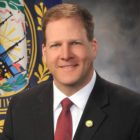Sign up for InDepthNH.org’s free weekly newsletter, mid-week update and Sunday weekender here.
Distant Dome is co-published by InDepthNH.org and Manchester Ink Link
By GARRY RAYNO, Distant Dome
Medicaid expansion under the Affordable Care Act has not been an easy sell in the New Hampshire Legislature since first proposed in 2013, but has eventually won bipartisan support.
The program provides health insurance to about 50,000 low-income adults and gained momentum over its lifetime with lawmakers calling it a cornerstone in the battle to stem the state’s opioid addiction epidemic.

Garry Rayno
The most significant program change in this year’s legislation would move coverage from private insurers to the managed care model used by the state’s traditional Medicaid program.
The move is expected to save significant dollars.
How to pay the state’s share of the cost, now about 7 percent, has been an issue.
Federal officials objected to providers — hospitals and insurers — paying the state’s share, so the new version would use 5 percent of liquor revenues to pay the bill.
The state’s share of the cost will grow to 10 percent in 2020 and thereafter if the federal government continues the program.

Former President Obama
The current version of the bill includes a work or education requirement and penalties for the unnecessary use of expensive emergency room services instead of visiting a primary care provider. Similar provisions were eliminated from past bills because they would not fly under the Obama administration, but are now OK under President Trump’s watch.

YouTube
President Donald Trump
Although Democrats objected to the restrictions in the past, red flags have not been seen this year as the proposed five-year renewal sailed through the Senate with all 10 Democrats and seven Republicans on board and won the 21-0 support of the House Health, Human Services and Elderly Affairs Committee.
The House committee made a few changes — expanding ways to meet the work requirement and changing the membership and areas the oversight commission would evaluate — to the bill the Senate approved.

Courtesy photo
Rep. William Marsh
Reporting for the committee, Rep. William Marsh, R-Wolfeboro, a physician, said using managed care will be considerably less expensive than private insurance.
“It is critically important to maintain coverage for the 50,000 people currently covered by this program,” Marsh writes. “It would be prohibitively expensive to alternatively fund necessary programs, such as those to address the opioid problem, with general fund dollars instead of this program.”

Gov. Chris Sununu, R-NH
The House takes its initial vote on Senate Bill 313 Thursday. That vote will establish the House policy either for the new expansion program or against it.
While not a slam dunk or a grand slam, the bill should pass with House leadership’s support as well as Gov. Chris Sununu’s.
The bill will be sent to House Finance which will review its financials and how that impacts policy.
Much like the family and medical leave program, SB 313 could emerge from Finance with a very different look.

Rep. Lynne Ober
Finance Committee chair Rep. Neal Kurk, R-Weare, has never been a fan of Medicaid expansion, and neither has vice chair Rep. Lynne Ober, R-Hudson.
After this week’s vote, things become a lot more dicey for the five-year extension of the Medicaid expansion program.
The Finance Committee is likely to take its time and the bill may not be before the House for a final vote much before the May 3 deadline for acting on all Senate bills.
And if it does pass, a conference committee is likely to try to bridge the gap between the House and Senate versions of the bill.
Medicaid expansion has a long way to go before a final vote on SB 313 with many opportunities to create chaos and decent.
Recovery Workplace
At the beginning of last month, Sununu launched “Recovery Friendly Workplace Initiative” to work with companies to provide support for people recovering from substance abuse.
The program will “help change the culture around addiction by engaging employers in being a proactive part of the conversation by providing tools, resources, and opening up access to treatment,” Sununu said at the time.
A number of prominent New Hampshire businesses such as AutoFair, Turbocam, Hypertherm and Grappone Automotive Group signed on as did several national corporations like WalMart.
Rhode Island quickly join the effort and other states expressed interest. Sununu touted the program with Trump when he visited the state last month to announce his drug abuse prevention initiative including the death sentence for some dealers.
However one of the key elements of recovery workplace, a tax credit against the state’s business taxes, is in trouble in the House.
Under the bill, which passed the Senate on a voice vote signaling little or no opposition, companies would receive a tax credit for donations made to the Community Development Finance Authority for the initiative.
The House Ways and Means Committee decided Senate Bill 563 needs more work and is recommending the bill be sent to interim study, which during the second year of a two-year term is a polite death. The next legislature elected in November has no obligation to take up recommendations of a study committee if there is one.

Rep. Patrick Abrami
Committee vice chair Rep. Patrick Abrami, R-Stratham said the committee agrees the state needs to support the recovery friendly workplace initiative.
“However, as we reviewed the mechanics of how this program would be administered many questions arose that did not have answers,” he said. “There was no game plan suggested in the bill for how the CDFA would make this a functional program.”
Abrami went on to list several major problems with the bill that need to be addressed with time running out this session.
And he noted the tax credit, which could be up to $6 million in a fiscal year, would reduce state revenues. The credit would not be available until Jan. 1 2019.
The program can go on without the tax credit but it will not be as attractive to businesses.
Aircraft Fees
A long-standing problem affecting few people directly but more indirectly is aircraft registration fees.
The number of aircraft registered in the state has been steadily declining as surrounding states — particularly Massachusetts — make it more attractive to register aircraft there, particularly a fleet of planes and new executive jets, the kind airports love to service.
Because of New Hampshire’s fee structure, a larger Gulfstream executive jet could cost about $300,000 a year if based in New Hampshire versus $300 in Massachusetts.
The decline in general aviation has particularly hit Pease International Tradeport and Nashua’s Airport.
The registration fee supports the state general fund and the Aviation Division within the Department of Transportation which in turn helps small local airports.
At one point lawmakers were contemplating eliminating the fees, but that would have cost over $1 million, and was rejected.
So lawmakers propose to lower the fees, but increase the aviation fuel tax to make the change revenue neutral for the state if not aircraft owners.

Rep. Timothy Lang
“Even with these changes in the aviation tax, NH aviation fuel tax rates would still be significantly lower than our neighboring states,” said Rep. Timothy Lang, R-Sanbornton, for the Ways and Means Committee. “These changes should help companies that modernize their fleets to stay in NH and not move their operations to Massachusetts. This bill also ensures that our 25 airports in this state would continue to be given modest assistance from the revenues generated from these registration fees.”
Like Senate bills 313 and 563, the House will vote on Senate Bill 564 Thursday.
Public hearings
The House Criminal Justice and Public Safety Committee holds a public hearing on Senate Bill 593, which would end the state’s death penalty replacing it with life without parole.
The bill passed the Senate but Sununu said he will veto it.
The hearing is in Room 204 of the Legislative Office Building at 10 a.m. Wednesday.
Also the Senate Finance Committee holds a public hearing on House Bill 628, which is the family and medical leave program.
The hearing is scheduled for 2:30 pm in Room 103 of the State House Thursday. If the Senate session goes long, the hearing will be held after the session ends.
Garry Rayno may be reached at garry.rayno@yahoo.com
Garry Rayno’s Distant Dome explores a broader perspective on State House – and state – happenings. Over his three-decade career Rayno has closely covered the NH State House for the New Hampshire Union Leader and Foster’s Daily Democrat, and his coverage spanned the news spectrum, from local planning, school and select boards, to national issues such as electric industry deregulation and Presidential primaries. He is former editor of The Hillsboro Messenger and Assistant Editor of The Argus-Champion. Rayno graduated from the University of New Hampshire with a BA in English Literature and lives with his wife Carolyn in New London.





